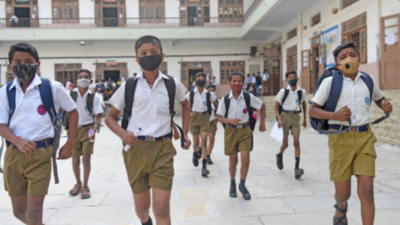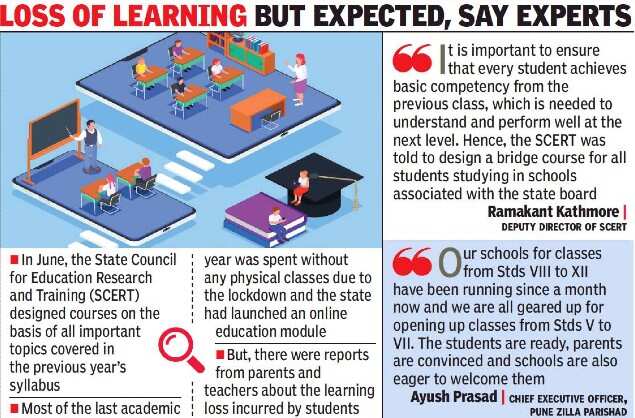Pune: Schools ready for in-person classes from next Monday

Schools have started to chalk out a new timetable for offline classes and the stress at the moment will be on practicals and hands-on training sessions (File Photo)
PUNE: The relaxations announced for commercial establishments have put schools in line for preparations to reopen for standards VIII to XII in the city and for standards from V to VIII in rural areas from August 16.
Villages had low positivity rates and academic sessions have been successfully held so far in rural areas for standards VIII to XII since a month.

Heads of schools said there was positive feedback from parents who wanted to send their children to school and were looking forward to the reopening.
Principal Shubha Kale said their survey of parents got a 60% positive response. “We are hoping that the remaining 40% would also agree once classes start rolling. We have begun preparations at our end,” she said.
Kshitij Bhor, a Std VIII student of Ashoka Madhyamik Vidyalaya in Manjari, said they have received the school’s notification about reopening and his parents had consented. “This is the best decision by the government as we are not gaining much from online teaching as 80% of the studies is self-study,” he added.
Schools have started to chalk out a new timetable for offline classes and the stress at the moment will be on practicals and hands-on training sessions.
Vishwas Dahanukar, administration head at the Cosmopolitan Education Society that runs nine schools across Maharashtra, said their staff has sprung into action with respect to the hygiene and other safety norms that the schools need to follow for reopening the schools.
“At the same time, we are also seeking opinions from parents and counselling them about the reopening plans,” he added.
The students have spent almost two academic years with virtual classes as a result of the school shutdowns due to Covid-19. Academicians have said the top 10% of the students could at the most cope with all changes that the pandemic brought in the education system.
The remaining have found it difficult in some aspect or the other to deal with online classes. Principal of the Orbis School, Nalini Samuel, said there are bound to be learning gaps which would have crept in due to the lack of classroom interaction.
“Some children who are shy by nature would not be comfortable speaking up in an online class and therefore a teacher may not be able to pick up on a lack of learning or understanding of a certain concept until it shows up in an assessment. That would mean an extra effort on the part of the teachers to plug these gaps and reinforce concepts when we get back to physical school,” she added.
Villages had low positivity rates and academic sessions have been successfully held so far in rural areas for standards VIII to XII since a month.

Heads of schools said there was positive feedback from parents who wanted to send their children to school and were looking forward to the reopening.
Principal Shubha Kale said their survey of parents got a 60% positive response. “We are hoping that the remaining 40% would also agree once classes start rolling. We have begun preparations at our end,” she said.
Kshitij Bhor, a Std VIII student of Ashoka Madhyamik Vidyalaya in Manjari, said they have received the school’s notification about reopening and his parents had consented. “This is the best decision by the government as we are not gaining much from online teaching as 80% of the studies is self-study,” he added.
Schools have started to chalk out a new timetable for offline classes and the stress at the moment will be on practicals and hands-on training sessions.
Vishwas Dahanukar, administration head at the Cosmopolitan Education Society that runs nine schools across Maharashtra, said their staff has sprung into action with respect to the hygiene and other safety norms that the schools need to follow for reopening the schools.
“At the same time, we are also seeking opinions from parents and counselling them about the reopening plans,” he added.
The students have spent almost two academic years with virtual classes as a result of the school shutdowns due to Covid-19. Academicians have said the top 10% of the students could at the most cope with all changes that the pandemic brought in the education system.
The remaining have found it difficult in some aspect or the other to deal with online classes. Principal of the Orbis School, Nalini Samuel, said there are bound to be learning gaps which would have crept in due to the lack of classroom interaction.
“Some children who are shy by nature would not be comfortable speaking up in an online class and therefore a teacher may not be able to pick up on a lack of learning or understanding of a certain concept until it shows up in an assessment. That would mean an extra effort on the part of the teachers to plug these gaps and reinforce concepts when we get back to physical school,” she added.
FacebookTwitterLinkedinEMail
Start a Conversation
end of article
Quick Links
Delhi Air PollutionDelhi TemperatureChennai WeatherBangalore TemperatureCovid vaccination centres in DelhiCoronavirus in DelhiRTPCR test in GurgaonHyderabad RainPollution level in BangaloreDelhi SmogDelhi TemperatureNoida AQIGurgaon AQI todayFire in MumbaiMumbai RainsCovid 19 RT PCR Test in NoidaDelhi AQI todaySrinagar encounter

